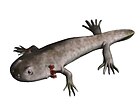Eryopoidea
| Eryopoidea Temporal range:
Pennsylvanian - Permian, | |
|---|---|

| |
| Life restoration of Eryops megacephalus | |
| Scientific classification | |
| Kingdom: | Animalia |
| Phylum: | Chordata |
| Class: | Amphibia |
| Order: | †Temnospondyli |
| Suborder: | †Euskelia |
| Superfamily: | †Eryopoidea Cope, 1882 |
| Families | |
| |
Eryopoidea are a taxon of late Carboniferous and Permian temnospondyli amphibians, known from North America and Europe. Carroll includes no fewer than ten families,[1] but Yates and Warren replace this with a cladistic approach and include three families, the Eryopidae, Parioxyidae and Zatrachydidae.[2] They define the Eryopoidea as all Euskelia in which the choana are relatively rounded and the iliac blade vertical. A similar definition but without the Euskelia is provided by Laurin and Steyer.[3]
References[]
- ^ Carroll, R. L. (1988). Vertebrate Paleontology and Evolution. W.H. Freeman & Co. ISBN 0-7167-1822-7.
- ^ & (2000). "The phylogeny of the 'higher' temnospondyls (Vertebrata: Choanata) and its implications for the monophyly and origins of the Stereospondyli". Zoological Journal of the Linnean Society. 128 (1): 77–121. doi:10.1111/j.1096-3642.2000.tb00650.x.
- ^ Laurin. M & (2000). "Phylogeny and Apomorphies of Temnospondyls - Tree of Life project".
External links[]
- Palaeos
- Eryopoidea – Mikko's Phylogeny Archive
Categories:
- Carboniferous temnospondyls
- Permian temnospondyls
- Pennsylvanian first appearances
- Permian extinctions
- Taxa named by Edward Drinker Cope














